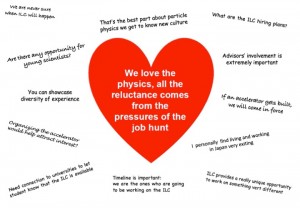The International Linear Collider will be run by people who are now at university or in their first jobs. For the early-career physicists who will be mid-career in 2035, the ILC may be the only new energy frontier accelerator in which they will be able to take a leadership role. If they wish to have the ILC as an option for their future, it is essential that they become involved in the Snowmass 2021 study – and all other strategy processes worldwide.
At the Americas Workshop on Linear Colliders, young American scientists there held a session with young scientists discussing their early careers in particle physics. Below, they voice their enthusiasm and their concern about the project.
Accelerator Frontier Group:
The Early-Career Accelerator Frontier Group is very happy that the ILC project is proceeding. We are excited for the opportunity to make use of the recent advances in superconducting RF, high-brightness sources, and beam dynamics concepts to build an even more powerful machine than originally envisioned. However, there are a number of roadblocks to early-career accelerator-scientist participation in the ILC. The main difficulty is clarity on which national labs will be participating and on what aspects. Since much of accelerator science is tied to specific facilities, lab funding allocations will drive a lot of hiring and research opportunities. Another concern is ensuring that there are suitable projects for PhD students, postdocs, and other early-career positions. This means relatively small scales and timelines (three to six years), as well as few opportunities to publish in high-impact journals and participate in mentorships availability. The 2020 Americas Workshop on Linear Colliders (AWLC2020) has addressed many of the above concerns and demonstrated a number of very exciting potential US contributions. We eagerly await more details and job opportunities.
Nikita Kuklev and Edith Nissen
Energy Frontier Group:
The Early Career Energy Frontier Group is excited about the physics potential of the ILC, particularly the energy upgrade scenarios. These higher energies not only provide precision Standard Model physics opportunities, but also gain access to improved phase space for studies of Beyond-the-Standard- Model scenarios. The physics potential is groundbreaking, and the proposed collider capabilities offer experimental scenarios that we as mainly LHC-era scientists are excited by. The cleaner collisions and the opportunity to work with polarised beams, as examples among many advantages, challenge us with new experiences. While the physics potential is enticing, full-scale adoption of ILC projects can put young scientists in a challenging position. With the low availability of tenure-track equivalent positions and the high competition for such jobs, some postdoctoral researchers are hesitant to “jump ship” from more established and funded projects. The opportunity cost in terms of visibility and project impact is unclear. Furthermore, the ILC is a mature endeavor, which leaves the impression that there is less room for new collaborators to make large impacts through hardware innovation. PhD candidates are in a better position to take part in ILC projects, but the current scale of such projects makes it difficult to translate the work done, particularly within the American system, into thesis work. We see a large potential for new tenure-track equivalent positions that are jointly focused on ILC and HL-LHC topics to leverage the expertise of a new generation of particle physicists. The 2020 Americas Workshop on Linear Colliders has provided the early-career particle physics community with additional insight and scope, and it has reassured us that there is room for hardware development and might have drawn funding agency interest. We are waiting for the call, and with ample experience already exploring the energy frontier, we are excited to cross a different ocean.
Grace Cummings and Amber Roepe
Instrumentation Frontier Group:
Members of the Snowmass Early Career-Instrumentation Frontier Group had questions on the funding status, timeline, the number of positions opening up, and on the current status of the detector system design since there has been some uncertainty about the ILC. We were thankful that many of these questions were answered at the workshop, which was very productive and informative. Overall the group is very excited about this project, and we think that the workshop has generated a lot of interest from the instrumentation frontier. We thank everyone for the opportunity for early-career members to provide input at the conference.
Stephen Butalla, Jacob Zettlemoyer and Kathleen Dunne


Recent Comments